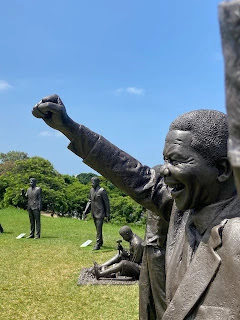INSPIRING LEADERS IN HISTORY
INSPIRING LEADERS IN HISTORY
Born in South Africa in 1918, Mandela became involved in the anti-apartheid movement at a young age, advocating for equal rights and an end to the oppressive system that segregated black South Africans from white South Africans.
In 1964, Mandela was sentenced to life in prison for his political activities, and he spent the next 27 years behind bars. Despite being imprisoned, Mandela never gave up on his cause, and his message of hope and reconciliation continued to inspire millions of people around the world.
In 1990, Mandela was finally released from prison, and he went on to lead South Africa through a peaceful transition to democracy. Mandela's leadership during this period was marked by a commitment to forgiveness and reconciliation, rather than revenge and retribution. His actions helped to heal the wounds of a divided nation and set the stage for a brighter future for all South Africans.
Mandela went on to become the first democratically elected President of South Africa in 1994, and he served in this role until 1999. Throughout his life, Mandela remained committed to promoting peace, justice, and equality, and his legacy as a great leader continues to inspire people all over the world to this day.
Born in Atlanta, Georgia in 1929, Martin Luther King Jr. became a Baptist minister and a leading figure in the American civil rights movement in the 1950s and 1960s.
King's leadership was marked by his unwavering commitment to nonviolence and his dedication to achieving racial equality and justice for all people. He led a number of peaceful protests, sit-ins, and marches, including the famous 1963 March on Washington, where he delivered his famous "I Have a Dream" speech.
Despite facing constant threats and violence, King never wavered in his beliefs or his commitment to his cause. His leadership helped to bring about significant changes in American society, including the passage of the Civil Rights Act of 1964 and the Voting Rights Act of 1965.
Sadly, King's life was cut short when he was assassinated in 1968. But his legacy as a great leader lives on. His message of love, peace, and justice continues to inspire people all over the world, and his work has paved the way for future generations to continue fighting for equality and justice for all people.
Mahatma Gandhi was born in India in 1869 and is known as the Father of the Nation. He was an Indian independence activist and spiritual leader who fought for India's independence from British rule in the early 20th century. Gandhi believed in nonviolent civil disobedience and peaceful resistance, and his methods inspired many others around the world.
Throughout his life, Gandhi worked tirelessly to end discrimination and inequality in Indian society. He advocated for the rights of the poor, the oppressed, and those who had been silenced by the ruling British colonial government. He believed in the power of love and compassion, and his message of nonviolence and peaceful resistance inspired millions of people.
One of Gandhi's most famous campaigns was the Salt March, which took place in 1930. In protest against the British government's monopoly on salt, Gandhi and his followers marched over 240 miles to the Arabian Sea, where they made salt by evaporating seawater. The Salt March was a powerful symbol of Indian resistance to British rule and helped to inspire a wave of protests and civil disobedience throughout the country.
Gandhi's leadership and advocacy for nonviolence helped to bring about India's independence in 1947. He continued to work for peace and justice until his assassination in 1948, but his message of nonviolence and peaceful resistance continues to inspire people all over the world to this day.
These are just a few examples, but there are many other leaders who have fought against discrimination and worked to promote equality and justice for all.
Know about more...
Subscribe to this blog so that our posts reach you immediately.
.webp)





Comments
Post a Comment